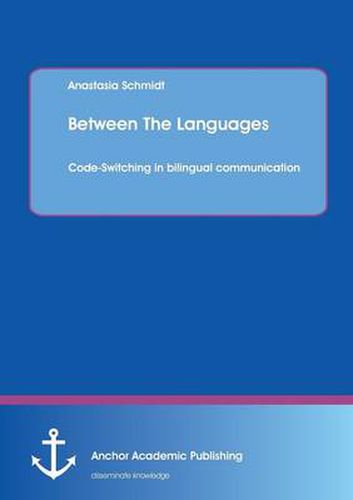Readings Newsletter
Become a Readings Member to make your shopping experience even easier.
Sign in or sign up for free!
You’re not far away from qualifying for FREE standard shipping within Australia
You’ve qualified for FREE standard shipping within Australia
The cart is loading…






This title is printed to order. This book may have been self-published. If so, we cannot guarantee the quality of the content. In the main most books will have gone through the editing process however some may not. We therefore suggest that you be aware of this before ordering this book. If in doubt check either the author or publisher’s details as we are unable to accept any returns unless they are faulty. Please contact us if you have any questions.
This book is about the use of two languages in everyday life. Bilingualism is a facet of nearly every country in the world and code-switching is a widespread characteristic of bilingual speech. An obvious and at the same time interesting aspect is that bilinguals will, of course, stay within one language when talking to monolinguals. However, when talking to other bilinguals, they will probably use both languages. Thus, in bilingual conversations, they often switch from one language to another and frequently even within an utterance. Such kinds of switches call for a special competence of the two languages involved. But how well the bilinguals have to know each of the languages is a justifiable question. These switches are not arbitrary since they may depend on the situation of the conversation, the topic of the conversation, the emotional aspects involved, the language preference of the speaker and the need to express the own identity. The goal of this book is to look in detail at code-switching in bilingual communication with the help of the present study on Russian-German bilinguals.
$9.00 standard shipping within Australia
FREE standard shipping within Australia for orders over $100.00
Express & International shipping calculated at checkout
This title is printed to order. This book may have been self-published. If so, we cannot guarantee the quality of the content. In the main most books will have gone through the editing process however some may not. We therefore suggest that you be aware of this before ordering this book. If in doubt check either the author or publisher’s details as we are unable to accept any returns unless they are faulty. Please contact us if you have any questions.
This book is about the use of two languages in everyday life. Bilingualism is a facet of nearly every country in the world and code-switching is a widespread characteristic of bilingual speech. An obvious and at the same time interesting aspect is that bilinguals will, of course, stay within one language when talking to monolinguals. However, when talking to other bilinguals, they will probably use both languages. Thus, in bilingual conversations, they often switch from one language to another and frequently even within an utterance. Such kinds of switches call for a special competence of the two languages involved. But how well the bilinguals have to know each of the languages is a justifiable question. These switches are not arbitrary since they may depend on the situation of the conversation, the topic of the conversation, the emotional aspects involved, the language preference of the speaker and the need to express the own identity. The goal of this book is to look in detail at code-switching in bilingual communication with the help of the present study on Russian-German bilinguals.